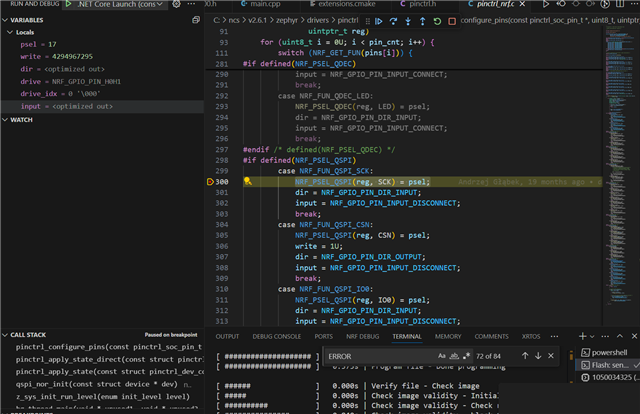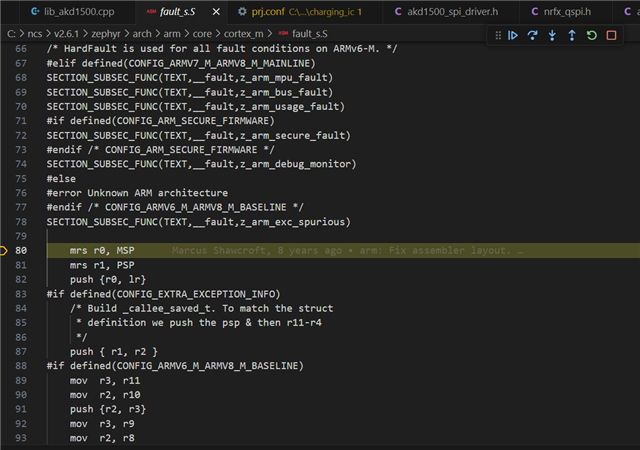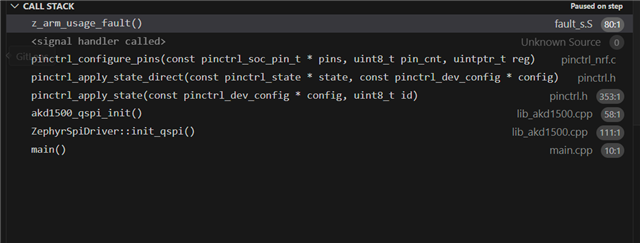Hello
I am trying to initialize qspi in a ".cpp" file and methods like
so I had to do this work around
#include <zephyr/drivers/flash.h>
#include <zephyr/drivers/pinctrl.h>
#include <zephyr/storage/flash_map.h>
#include <nrfx_qspi.h>
#include <stdint.h>
/* Define QSPI node from devicetree */
#define QSPI_NODE DT_NODELABEL(qspi)
/* Hardcoded pin configuration */
static const pinctrl_soc_pin_t qspi_pins[] = {
NRF_PSEL(QSPI_SCK, 0, 17), // SCK on P0.17
NRF_PSEL(QSPI_IO0, 0, 13), // IO0 on P0.13
NRF_PSEL(QSPI_IO1, 0, 14), // IO1 on P0.14
NRF_PSEL(QSPI_IO2, 0, 15), // IO2 on P0.15
NRF_PSEL(QSPI_IO3, 0, 16), // IO3 on P0.16
NRF_PSEL(QSPI_CSN, 0, 18), // CSN on P0.18
};
/* Define the state for QSPI */
static const struct pinctrl_state qspi_pin_states[] = {
{
.pins = qspi_pins,
.pin_cnt = ARRAY_SIZE(qspi_pins),
.id = PINCTRL_STATE_DEFAULT,
},
};
/* Define the pinctrl_dev_config for QSPI */
static const struct pinctrl_dev_config qspi_pinctrl_config = {
.states = qspi_pin_states,
.state_cnt = ARRAY_SIZE(qspi_pin_states),
};
/* Configure and initialize QSPI */
static int qspi_init(void)
{
static const nrfx_qspi_config_t qspi_config = {
.prot_if = {
.readoc = NRF_QSPI_READOC_READ4IO,
.writeoc = NRF_QSPI_WRITEOC_PP4IO,
.addrmode = NRF_QSPI_ADDRMODE_24BIT,
},
.phy_if = {
.sck_delay = 0x05,
.dpmen = false,
.spi_mode = NRF_QSPI_MODE_0,
.sck_freq = NRF_QSPI_FREQ_DIV2,
},
.skip_gpio_cfg = true,
.skip_psel_cfg = false,
};
int ret = pinctrl_apply_state(&qspi_pinctrl_config, PINCTRL_STATE_DEFAULT);
if (ret < 0)
{
LOG_ERR("Failed to apply pinctrl state");
return ret;
}
nrfx_err_t err = nrfx_qspi_init(&qspi_config, NULL, NULL);
if (err != NRFX_SUCCESS)
{
LOG_ERR("QSPI initialization failed: %d", err);
return -EIO;
}
LOG_INF("QSPI initialized");
return 0;
}
int qspi_read(uint32_t address, void *data, size_t size)
{
int ret = nrfx_qspi_read(data, size, address);
if (ret != NRFX_SUCCESS)
{
LOG_ERR("QSPI read failed: %d", ret);
return -EIO;
}
LOG_INF("QSPI read successful");
return 0;
}
int qspi_write(uint32_t address, const void *data, size_t size)
{
int ret = nrfx_qspi_write(data, size, address);
if (ret != NRFX_SUCCESS)
{
LOG_ERR("QSPI write failed: %d", ret);
return -EIO;
}
LOG_INF("QSPI write successful");
return 0;
}however it this method causes the firmware to hault exactly at this line

thank you for your time.


